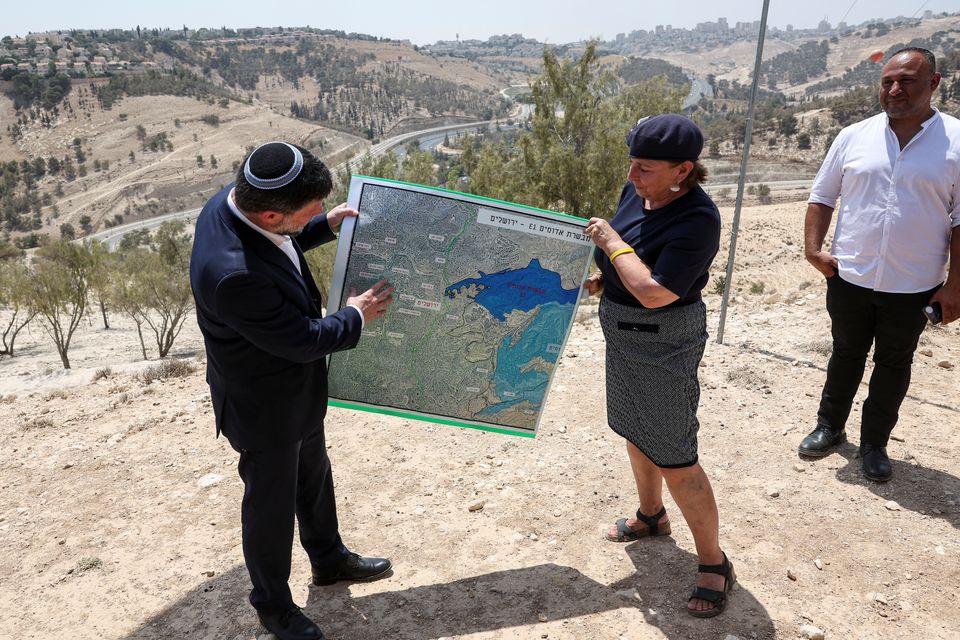World
Israeli Minister Announces Controversial Settlement Plan Amid Tensions

Israeli Finance Minister Bezalel Smotrich announced plans to revive a controversial settlement project in the West Bank, a move he claims will “bury” the prospect of a Palestinian state. Speaking at a site in Maale Adumim, Smotrich indicated that construction would commence on a long-delayed project aimed at linking the settlement to East Jerusalem. He asserted that both Prime Minister Benjamin Netanyahu and former U.S. President Donald Trump had agreed to the revival of the E1 scheme, although there was no immediate confirmation from either leader.
During his address, Smotrich stated, “Whoever in the world is trying to recognise a Palestinian state today will receive our answer on the ground. Not with documents nor with decisions or statements, but with facts. Facts of houses, facts of neighbourhoods.” This announcement follows a history of halted construction plans in the area, with construction at Maale Adumim frozen since 2012 due to objections from the United States and European allies, who viewed the project as detrimental to potential peace negotiations with the Palestinians.
The renewed settlement initiative is expected to exacerbate tensions, particularly as Israel faces condemnation from several Western allies regarding its military operations in Gaza. The Palestinian Authority has expressed deep concerns, fearing that such settlement expansions will eliminate any possibility of establishing a viable state.
In a statement titled “Burying the idea of a Palestinian state,” Smotrich’s office revealed plans to construct 3,401 houses for Israeli settlers between an existing settlement and Jerusalem. Smotrich indicated that the plan would take effect on Wednesday, though specifics regarding the implementation were not disclosed.
The Palestinian Foreign Ministry condemned the settlement plan as an extension of “crimes of genocide, displacement and annexation.” Israel has consistently denied allegations of genocide and maintains that its actions are defensive. In response to Smotrich’s announcement, the militant group Hamas criticized the plan as part of Israel’s “colonial, extremist” policies and urged Palestinians to resist it.
In a broader context, Jordan’s Foreign Ministry termed the initiative a flagrant violation of international law. The organization Peace Now, which monitors settlement activities, noted that several procedural steps remain before construction can begin, including approval from Israel’s High Planning Council. If completed, infrastructure work could commence within a few months, with actual house building expected within a year.
The situation in Gaza remains dire, with local health authorities reporting that over 61,000 people have died due to the ongoing conflict. This backdrop of violence has further demoralized Palestinians, who fear losing their territorial claims. Currently, approximately 700,000 Israeli settlers reside in the West Bank, which is home to around 2.7 million Palestinians.
Israel’s annexation of East Jerusalem is largely unrecognized internationally, and the country has not formally extended its sovereignty over the West Bank. The United Nations and most global powers argue that continued settlement expansion undermines the feasibility of a two-state solution, which envisions an independent Palestinian state alongside Israel.
The ongoing conflict over these settlements is not just a matter of land; it reflects a deeper struggle over identity and security. The two-state solution, which aims to establish a Palestinian state in East Jerusalem, the West Bank, and Gaza, faces increasing challenges as Israel cites historical claims to the territory, referring to it as Judea and Samaria.
Most of the international community regards all settlements as illegal under international law, a stance supported by numerous UN Security Council resolutions. In June, countries including Britain, Canada, Australia, and New Zealand imposed sanctions on Smotrich and another far-right minister for inciting violence against Palestinians.
Recent polls indicate a decline in Smotrich’s popularity, suggesting that if parliamentary elections were held today, his party would struggle to secure any seats. His political base primarily consists of settlers, highlighting the complex dynamics at play in Israeli politics and the ongoing Israeli-Palestinian conflict.
-

 Top Stories3 months ago
Top Stories3 months agoTributes Surge for 9-Year-Old Leon Briody After Cancer Battle
-

 Entertainment4 months ago
Entertainment4 months agoAimee Osbourne Joins Family for Emotional Tribute to Ozzy
-

 Politics4 months ago
Politics4 months agoDanny Healy-Rae Considers Complaint After Altercation with Garda
-

 Top Stories4 months ago
Top Stories4 months agoIreland Enjoys Summer Heat as Hurricane Erin Approaches Atlantic
-

 World5 months ago
World5 months agoHawaii Commemorates 80 Years Since Hiroshima Bombing with Ceremony
-

 Top Stories3 months ago
Top Stories3 months agoNewcastle West Woman Patricia Foley Found Safe After Urgent Search
-

 Top Stories5 months ago
Top Stories5 months agoFianna Fáil TDs Urgently Consider Maire Geoghegan-Quinn for Presidency
-

 World5 months ago
World5 months agoCouple Convicted of Murdering Two-Year-Old Grandson in Wales
-

 World5 months ago
World5 months agoGaza Aid Distribution Tragedy: 20 Killed Amid Ongoing Violence
-

 World5 months ago
World5 months agoAristocrat Constance Marten and Partner Convicted of Infant Murder
-

 Top Stories4 months ago
Top Stories4 months agoClimbing Errigal: A Must-Do Summer Adventure in Donegal
-

 Top Stories4 months ago
Top Stories4 months agoHike Donegal’s Errigal Mountain NOW for Unforgettable Summer Views









